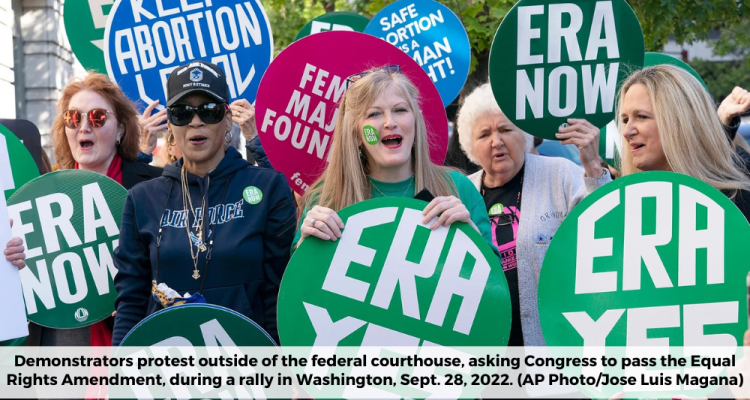Editor’s Note: Previously published on RNS on April 27, 2023.
It is time to abolish the myth of ‘differently equal’ once and for all.
(RNS) — “As pernicious as the racial doctrine of ‘separate but equal.’”
That’s how the Rev. Pauli Murray, the civil rights and women’s rights trailblazer, described a legal system that discriminates based on sex. Murray dedicated herself to an extraordinary life of challenging the twin evils of racial and gender discrimination.
On Thursday (April 27), Murray’s hopes for human rights inch closer to victory, as a reform she championed comes before the U.S. Senate for a historic vote. If the Senate passes the bipartisan Senate Joint Resolution 4, the Equal Rights Amendment, originally approved by a supermajority of Congress in 1972 and approved by three-fourths of the states, will become “valid to all intents and purposes as part of the U.S. Constitution.”
This vote is about the bedrock principle of equality under the law for all citizens, regardless of sex. Affirming the ERA should be a no-brainer in a modern democracy like the United States that claims to uphold human rights.
As faith leaders concerned about the harms of gender-based violence, pregnancy discrimination, maternal mortality and other injustices, we believe full equality is an urgent moral imperative. Every one of these harms has an outsized impact on women of color and their families.
The ERA remains deeply contested, however — not based on minutiae of constitutional procedure, as some opponents claim, but on the age-old struggle for women to be respected as fully human, entitled to the same rights as men.
A vast majority of Americans support the ERA, including faith leaders from a diversity of religions. They agree that all people should be safeguarded against the indignities of sexism and the harms of gender-based violence. As nearly 600 faith leaders affirm in an interfaith petition in support of the ERA, “All people are equally valuable in the sight of their Creator, and thus deserve equal regard in human laws and legal systems.”
It is truly this simple, and this revolutionary.
In his 2011 book “The Idea of Justice,” philosopher Amartya Sen explains how the principle of equality, which animated demands of the American Revolution, remains central to “every normative theory of social justice” well-accepted in today’s world. Equality is an essential element of fairness and impartiality; it prevents a system from being arbitrary or biased against some in favor of others.

Demonstrators, part of a crowd of 25,000, march along Chicago’s lakefront on May 10, 1980, in support of the Equal Rights Amendment. Many churches and religious organizations participated in the event. RNS archive photo. Photo courtesy of the Presbyterian Historical Society.
At a Senate committee hearing on the ERA in late February, opponents veered as far as possible from the heart of the matter and doggedly tried to frame the debate around procedure — because the anti-egalitarian sentiment underpinning their opposition is anathema to 21st-century America.
Opponents insist it is too late to finalize this amendment, or that certain states revoked their decisions to ratify the ERA. But renowned constitutional law scholar Laurence Tribe and others have thoroughly debunked these notions — and they were never the real issue to begin with.
As Lindsey Graham made clear at the hearing, he is intent on killing the ERA regardless of what process it undergoes.
The ERA’s Senate opponents (all Republicans) claim that U.S. women have already achieved gender parity but that somehow legal equality would be dangerous to women’s interests. In other words, they think women need “special protections” under the law rather than equal rights. Think of this as “differently equal” — as the Supreme Court does.
Currently, the court applies a unique standard to sex discrimination cases under the equal protection clause of the 14th Amendment. Sex-based distinctions in government laws, policies and practices are in essence more readily tolerated than racial or religious distinctions. This uneven standard of equal protection reflects an uneven history: The doctrine did not apply to women at all before the early 1970s.
The notion that this middling brand of “equality” benefits women is untrue. It has not come close to eradicating the widespread injustice many suffer today, such as life-altering pay discrimination, runaway maternal mortality, epidemic domestic violence and ominous medical risks faced by pregnant people since the Dobbs v. Jackson Supreme Court decision last June.
At the February hearing, Republican opponents conceded that the 14th Amendment does not provide a legitimate guarantee of full equality — and they do not actually want one.
Granted, some women’s biological capacity for childbearing gives rise to particular needs — for prenatal health care and consideration during pregnancy, for instance. But the murky intermediate scrutiny of “differently equal” is failing to meet these needs.
This is precisely why the ERA’s more robust standard of sex equality is necessary.
Today, women live under a Supreme Court precedent that pregnancy discrimination is not “sex discrimination.” The newly adopted Pregnant Workers Fairness Act, which goes into effect this summer, represents the latest effort to secure basic accommodations for pregnant workers. But it does not cover all employers, and experience shows that its helpfulness will turn on judicial interpretation.
A constitutional principle of full equality should inform how this law is applied.
The ERA will also undergird much-needed legislation, such as the proposed Black Maternal Health Momnibus Act. The ERA will empower Congress to enforce equality with relevant laws like these, which makes them more secure against court challenges. In recent years, laws prohibiting female circumcision and violence against women have been struck down for want of a constitutional foundation.
As former Stanford Law School dean Kathleen Sullivan testified in February, the “majestic” guarantee of equality under the law allows space for equity, too. It need not amount to banning public officials from considering gender altogether — but it will require gender distinctions in the law to be exceedingly well justified, not mere concessions to sex stereotypes or traditional roles.
Our ethnic, cultural and religious differences are meaningful, and our diversity as a nation is worth celebrating. Each human being is a singular creation, never to be replicated. God broke the mold after making each of us.
But our uniqueness as individuals and communities must not be used to elevate some over others or reinforce painful and oppressive hierarchies — such as white or male or Christian supremacy.
Since our nation’s founding, gender differences have been used to relegate women to second-class status, ignore their needs, impose double standards and tolerate the cruelest forms of violence.
It is time to abolish the myth of “differently equal” once and for all — and relegate it to the dustbin of history, alongside “separate but equal,” where it belongs.
Allyson McKinney Timm is founder and executive director of Justice Revival and convener of the #Faith4ERA interfaith campaign for the Equal Rights Amendment. Tarunjit Singh Butalia is a board member of Faith in Public Life and executive director of Religions for Peace USA. Lisa Sharon Harper is founder and president of Freedom Road and author of “Fortune” and “The Very Good Gospel.”

